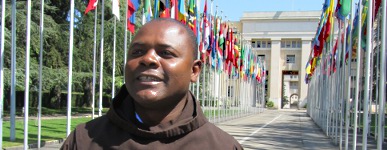FI & Treaty Alliance partners drive dialogue around the legally binding instrument on Business & Human Rights
FI co-hosted a high level side-event at the Human Rights Council last Thursday, March 19th. The panel explored European perspectives on the legally binding instrument on business and human rights, exposing an array of – sometimes clashing – points of view.
When the resolution was passed in 2014, to set up an intergovernmental working group (IGWG) to establish a legally binding instrument for business and human rights, the European Union declared its non-participation in the IGWG. Today’s side-event gave voice to the differing European perspectives regarding the need for the treaty, its relationship with the Guiding Principles on Business and Human Rights endorsed by the Human Rights Council in 2011, and how to engage in the IGWG negotiations that begin in July 2015.
Jerome Bellion Jourdan, from the Delegation of the European Union to the UN, and representing the EU’s official position, defended the strength of the Guiding Principles, underlining that they were a clear reminder of States’ obligations and have triggered policy changes in EU member states. From the EU’s perspective, the Guiding Principles are enough to curb human rights abuses perpetrated by business. Bellion Jourdan indicated, however, that the EU was ready to revise its position of non-participation in the IGWG if four parameters were fulfilled: 1)the IGWG should be chaired by a neutral party, not by a sponsor of the treaty, 2)the treaty should apply to national companies, not only to transnational companies, 3)there should be a clear commitment to the Guiding Principles being implemented nationally, and 4)relevant expertise should be in the room, representing all parties involved.
The legal perspective, clearly articulated by Mr Richard Meeran, a pioneer in litigation against multinational companies, contradicted the argument that the Guiding Principles were sufficient. Meeran demonstrated the need for a legally-binding instrument by offering practical insights into the issues (such as procedural barriers, or jurisdiction, for example) that one runs into when companies are not bound by clear international laws to respect certain rights. FI echoed this opinion, as Francesca Restifo, FI’s Advocacy Director, made clear in her statement in the subsequent open discussion: “FI supports the need for a legally binding instrument because, according to cases we are following with our local partners in around 50 countries, the Guiding Principles proved to be insufficient and ineffective; their good intentions did not translate into concrete change for either local communities or for victims.”
Anne van-Shaik, representing European civil society, delivered a passionate plea to the EU, explaining that the Resolution passed last year had given renewed hope to cynical grassroots actors who had lost their faith in the UN system and its lengthy discussions: “This is a new opportunity to engage with the UN, to engage with the Resolution. Don’t turn your back now. Come to the table in July, and discuss your parameters there!”
Despite differing points of view, several themes were reiterated by all: the desire to involve as many actors and perspectives as possible in a democratic process (argued strongly by Ms. Elena Valenciano, chair of the Sub-Committee on Human Rights at the European Parliament, representing a nuanced view of the EU’s worrying position), the admission that the treaty should address local businesses as well as transnational companies, and the complementarity of the Guiding Principles and the legally-binding instrument. Finally, all were reminded to think of those affected by human rights violations, and to put their perspectives first.
As Silvano Tomasi, Permanent Observer of the Holy See, noted, a legally-binding instrument is “an opportunity to humanise the economy.” FI continues to work energetically in the area of business and human rights, to ensure that concrete measures are being taken to protect the rights of the most marginalised.
Check back later for the full report of the side-event.




 Franciscans International
Franciscans International